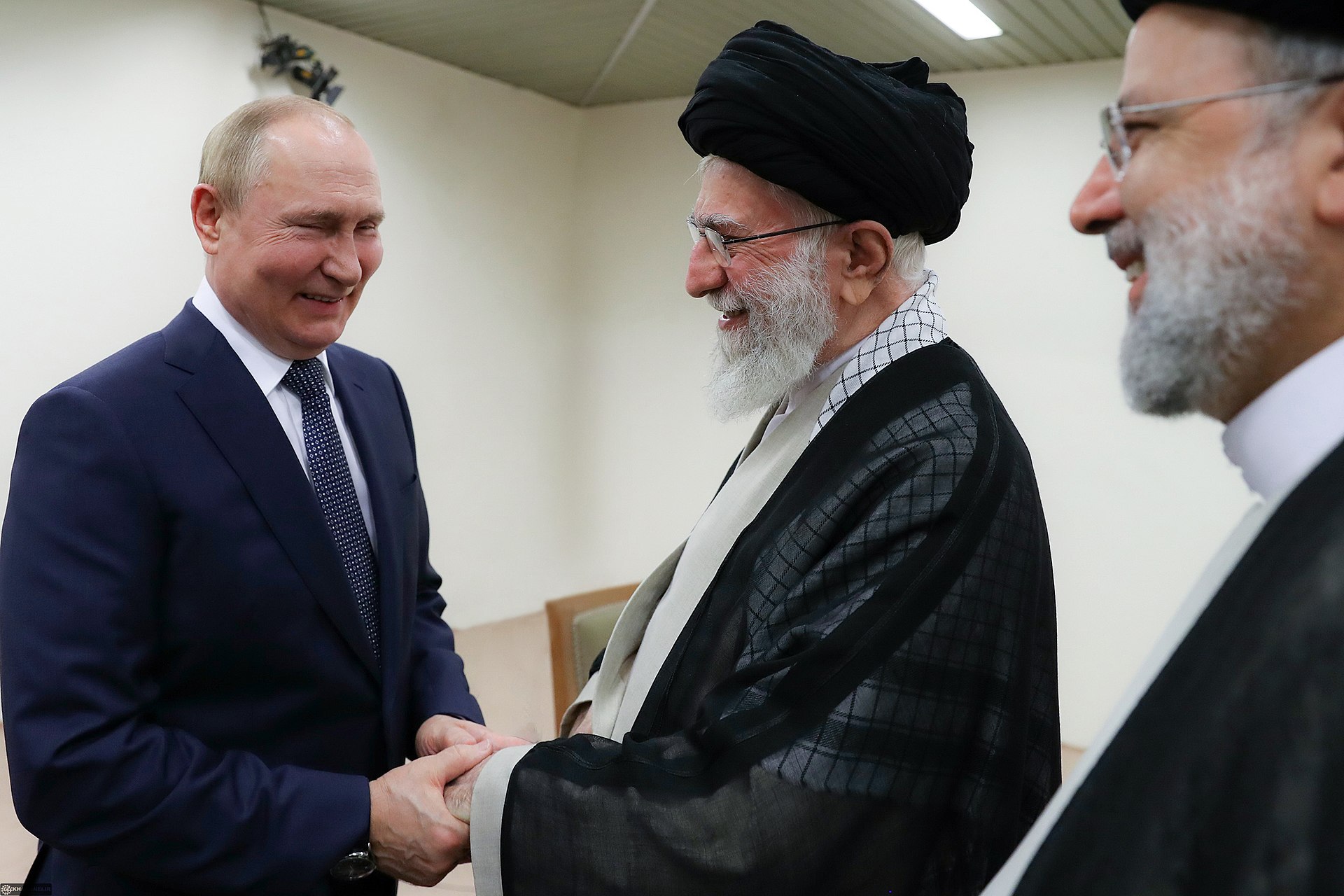 Russian President Vladimir Putin with Iranian Supreme Leader Ali Khamenei and Iranian President Ebrahim Raisi in Tehran (2022).
Russian President Vladimir Putin with Iranian Supreme Leader Ali Khamenei and Iranian President Ebrahim Raisi in Tehran (2022).
Russia-Iran Partnership Can Bring U.S.’s European, Middle Eastern Allies Closer
The Russia-Iran partnership creates an opportunity for the United States to pursue enhanced defense cooperation between Europe, Israel, and U.S.-allied Arab states. Iran’s unprecedented attack on Israel last month, which followed Russia’s blueprint in Ukraine, was defeated by Israel and a coalition of the United States, the United Kingdom, France, and Jordan—along with intelligence support from Saudi Arabia and the United Arab Emirates. This defensive operation likely prevented a regional war and demonstrated how enhanced defense cooperation between the U.S. and its European and Middle Eastern allies can enhance stability in the region.

Iranian missiles over Al-Aqsa in Jerusalem during the April 14 attack.
Russia and Iran seek to upend the U.S.-led international order and facilitate an American withdrawal from their spheres of influence. Both nations seem to believe this can be more easily achieved through collaboration. While Iran supplies Russia with drones and munitions for its war in Ukraine, Russia provides Iran with advanced air defense systems, assistance to its space program, and insights gained from fighting against American weapons.
There does not appear to be widespread discussion of just how intertwined the threats posed by Russia and Iran are. However, some are beginning to take a closer look. An April 18 brief by the Institute for the Study of War, titled “Why You Can’t be an Iran Hawk and a Russia Dove,” put it best: “Those concerned with the growth of Iran’s military power, ambitions, and aggression in the Middle East must recognize the degree to which Iran’s fortunes rise and fall with Russia’s.”

Aftermath of a Russian attack using Iranian drones in Kyiv, Ukraine (2022).
Israel and U.S.-allied Arab states, which consider Iran their primary adversary, may or may not have recognized this but regardless have refrained from forcefully condemning Russia. Saudi Arabia and the U.A.E. maintain cordial relations and robust trade ties with Moscow. Israel, on the other hand, requires coordination with Russia to operate in Syria, complicating Jerusalem’s ability to side with the West against Russian aggression.
But now, Russia is creating distance from Israel, evidenced not only by its partnership with Iran but also by hosting Hamas officials and publicly condemning Israel’s war in Gaza. Additionally, Russia’s contemplation of providing Iran with advanced aircraft, upgraded air defense systems, tanks, and other military hardware surely raises concerns in Arab capitals. The Russia-Iran partnership thus presents an opportunity for the U.S. to foster closer defense ties between its European and Middle Eastern allies. However, achieving this will require significant political will from the Arab states at a time when their publics are enraged at Israel and the West over the war in Gaza.
The tactical feasibility of such a coalition became evident during Iran’s attack on Israel, when the U.S. and European allies worked seamlessly alongside Israel and Arab partners to intercept Iranian projectiles. According to Dana Stroul, the former U.S. Deputy Assistant Secretary of Defense for the Middle East, this proved “the U.S. military is capable of operationally integrating its partners, informed by unparalleled intelligence and unmatched technology, to defend the security of citizens and territory from Russian and Iranian aggression.” The U.S. should lead an effort to further integrate European and Middle Eastern defense capabilities through joint military exercises, enhanced intelligence-sharing, and stronger defense manufacturing ties. Multi-regional coordination will serve to stabilize the Middle East; this was exemplified by the coalition’s success in defending Israel, which reduced the need for Israel to respond in an extreme fashion and likely prevented an all-out war.

U.S. President Joe Biden with members of the National Security Council as the Iranian attack on Israel unfolds.
As noted by the Institute for the Study of War, “Moscow and Tehran have formed a military bloc with the aim of defeating the United States and its allies in the Middle East, Europe, and around the world.” The U.S. and its allies in the Middle East and Europe should respond in kind. It may be difficult to envision a unified front when Washington itself is divided over support for Ukraine and Israel, and Israel and the Arab states are at odds over the war in Gaza. However, our adversaries are on the move, working together to achieve their objectives. Russia’s invasion of Ukraine and Iran’s attack on Israel—along with their growing cooperation—provide the U.S. and its allies with a unique opportunity to shed the myopic view that these threats are confined to their respective regions.
Image Credit (1): “Meeting between Putin and Khamenei 2” by khamenei.ir is licensed under CC BY 4.0.
Image Credit (2): “2024 Iranian strikes in Israel” by Unknown authorUnknown author is licensed under CC BY 4.0.
Image Credit (3): “Kyiv after Russian drone attack, 2022-10-17 (54)” by Main Directorate of the State Emergency Service of Ukraine in Kyiv is licensed under CC BY 4.0.
Image Credit (4): The White House on Flickr.





